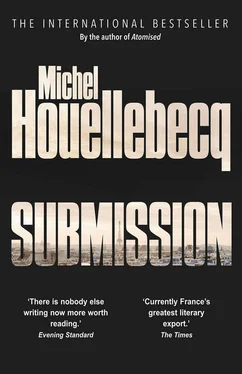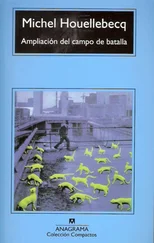It was two weeks before I received the letter from Paris III. According to the new statutes of the Islamic University of Paris-Sorbonne, I was no longer permitted to teach. Robert Rediger, the new president of the university, had signed the letter himself. He expressed his profound regret and assured me that this was no reflection on the quality of my scholarship. I was, of course, welcome to pursue my career in a secular university. If, however, I preferred to retire, the Islamic University of Paris-Sorbonne could offer me a pension, effective immediately, at a starting monthly rate of 3,472 euros, to be adjusted for inflation. I was invited to schedule a meeting with HR in order to fill out the necessary paperwork.
I reread the letter three times in disbelief. It was, practically to the euro, what I’d have got if I had retired at sixty-five, at the end of a full career. They really were willing to pay to avoid any trouble. No doubt they had overestimated the ability of academics to make a nuisance of themselves. It had been years since an academic title gained you access to major media, under rubrics such as ‘tribune’ or ‘points of view’; nowadays these had become a private club. Even if all the university teachers in France had risen up in protest, almost nobody would have noticed, but apparently they hadn’t found that out in Saudi Arabia. They still believed, deep down, in the power of the intellectual elite. It was almost touching.
From outside, nothing about the university looked different, except for the gilded star and crescent above the doors, next to the big inscription ‘Université Sorbonne Nouvelle — Paris III’. Inside the administrative buildings, the transformations were more visible. In the waiting room, one was welcomed by a photograph of pilgrims making their way around the Kaaba, and the offices were decorated with posters bearing hand-lettered verses from the Koran. The secretaries had changed, I didn’t recognise any of them, and they all wore veils. One of them gave me a pension application. Its simplicity was disconcerting. I filled it out right there, on the corner of a table, signed it and gave it back. As I walked out into the courtyard, I realised that my academic career had just ended in a matter of minutes.
When I got to the Censier metro I stopped at the top of the stairs, not knowing what to do. I couldn’t go straight home as if nothing had happened. The stalls of the Mouffetard market had just opened. I was wandering along the edges of the charcuterie d’Auvergne, contemplating the flavoured saucissons (blue cheese, pistachio, hazelnut) without really seeing them, when I spotted Steve coming up the street. He saw me at the same time, and it looked as if he wanted to avoid me, but it was too late, I was already walking towards him.
As I expected, he had accepted a position at the new university: he was teaching a course on Rimbaud. He clearly found the situation embarrassing, and he added, unprompted, that the new administration hadn’t interfered at all with the content of his course. That is to say, Rimbaud’s conversion to Islam was presented as a matter of historical fact — though this was controversial, to say the least — but when it came to analysing the poems, he really had been left alone, and that’s what counted. The longer I listened without any sign of indignation, the more he relaxed, and in the end he invited me for coffee.
‘It took me a long time to make up my mind,’ he said, once he’d ordered a Muscadet. I nodded, full of warmth and understanding; I figured it had taken him ten minutes, tops. ‘But the salary was pretty attractive …’
‘Even the pension isn’t bad.’
‘The salary’s a lot better.’
‘How much better?’
‘Three times more.’
Ten thousand euros a month for a mediocre teacher no one had ever heard of who couldn’t produce a paper worthy of the name — they really did have deep pockets. Oxford had slipped through their fingers; the Qataris had swooped in at the last minute with a higher bid, so they’d decided to double down on the Sorbonne. They’d even bought up flats in the Fifth and Sixth Arondissements for faculty housing. He’d been given a very attractive two-bedroom in the rue du Dragon for next to nothing.
‘I think they really wanted to keep you,’ he added, ‘but they didn’t know where you were. To be honest, they actually asked me to help them track you down; I had to tell them I only saw you at work.’
A few minutes later, he walked me to the metro. Just as I was about to enter the station, I asked, ‘What about the girls?’ He grinned. ‘Obviously, that’s all changed. I guess you could say things are organised differently now. I got married,’ he added, rather brusquely. Then he elaborated: ‘To one of my students.’
‘They arranged that for you, too?’
‘Not exactly. Let’s just say they don’t discourage the possibilities of contact with female students. I’m getting another wife next month.’ With that he headed off towards the rue de Mirbel, leaving me open-mouthed at the top of the stairs.
I stood there for several minutes and then finally decided to go home. When I reached the platform, I saw that the next train to Mairie d’Ivry was leaving in seven minutes. A train pulled into the station, but it was going to Villejuif.
I was in my prime . I didn’t suffer from any lethal illness. The health problems that regularly assailed me were painful, but they were minor. I had a good thirty or even forty years before I reached that dark zone where all illnesses are basically fatal, where nearly every illness entails an end-of-life discussion. I had no friends, that was true, but when did I ever? Besides, if you really thought about it, what was the point of having friends? Once you reach a certain stage of physical decline, the only relationship that really, clearly makes sense is marriage (the bodies blend together, to a degree, and produce a new organism, at least if you believe Plato). That stage was well on its way. I had maybe ten years, probably less, before the decline grew visible and I could no longer be described as still young . As for my marital prospects, clearly, I was off to a bad start. Over the passing weeks, Myriam’s emails had become more infrequent, and shorter. Lately she had given up the salutation ‘Dearest’ and replaced it with a neutral ‘François’. It was only a matter of weeks, I thought, before she, too, would announce that she had met someone . The meeting had already taken place, that much I knew. I don’t know exactly how I knew, but something in her choice of words, in the diminishing number of her smiley faces and hearts, left no room for doubt. She just didn’t have the courage to tell me. She was pulling away from me, it was as simple as that. She was making a new life for herself in Israel — what did I expect? She was a lovely girl, intelligent and kind, extremely attractive. Yes, what did I expect? For Israel, at any rate, she showed the same unflagging enthusiasm. ‘It’s hard, but I know why I’m here,’ she wrote. Obviously, that was more than I could say.
Although it took a few weeks to sink in, the end of my academic career had deprived me of all contact with female students. What was I supposed to do? Sign on to a dating site like Meetic, as so many had done before me? I was a man of culture. I had a certain status. As I’ve said, I was in my prime ; and if, after several weeks of strained conversation, in which one or two bursts of enthusiasm on whatever subject — say, Beethoven’s late quartets — covered up my growing, generalised ennui and held out the promise of magical moments or of a complicity based on shared wonder and laughter; if after several weeks I actually met up with one of my numerous female analogues, what would come of it? Erectile dysfunction on one side, vaginal dryness on the other. I’d just as soon avoid it.
Читать дальше







